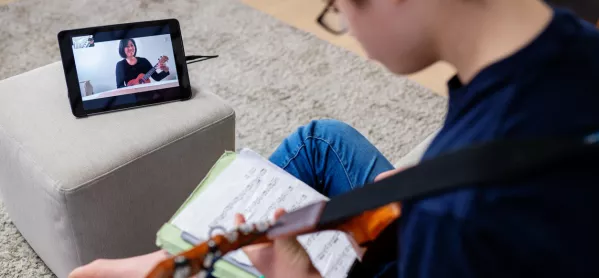- Home
- High levels of engagement in lockdown music teaching
High levels of engagement in lockdown music teaching

New research into how music was taught during lockdown has found that - despite initial scepticism from teachers - online learning often resulted in high levels of student engagement and less “dead time”.
The report said: “Teachers commented on generally high levels of student engagement, with students focused and on task and less dead time.
“Levels of student uptake were high. One [local authority] reported on 2,000 live lessons per week with some 80 per cent engagement and 2,600/3,200 students online.”
Background: Heads fear online learning not reaching all pupils
Music: ‘Lockdown was an incredibly creative time at school’
More research: Families ‘desperate’ for live teaching, survey finds
Coronavirus: Why music is key when schools reopen
Teachers’ take: Pupils not engaging with online learning
Advice: 4 essentials for long-term online learning
The research was commissioned by the Music Education Partnership Group (MEPG) - a charity drawing its membership from 53 organisations involved in music education - in a bid to better understand what happened in music education in the early months of the Covid-19 pandemic.
It found that while the advice to teachers generally was to focus on concepts previously covered in class, music teachers working online “continued with teaching” and introduced “new learning as opposed to basing online sessions on ground previously covered”.
The research report - published yesterday and written by Lio Moscardini and Andrew Rae - said: “Tutors reported that students were generally more engaged, there were fewer distractions and most significantly, students were generally considered to be making better progress.”
The music tutors and teachers even managed in some cases to deepen their relationship with parents because they were often in the room when lessons were taking place, according to the research.
The teachers achieved this despite the majority having had no previous experience of delivering lessons online; surveys for the study of over 200 music teachers and tutors and 25 youth music organisations found that 87 per cent of respondents had only been engaging with online musical activity for the last six months, out of necessity owing to lockdown.
However, online learning was not always plain sailing, the research found, with some teachers “reluctance and in some cases apparent ‘fear’ of technology” highlighted as a barrier.
Almost two-thirds of music teachers and tutors (62 per cent) did not feel adequately prepared for the transition to online teaching
One interviewee said: “A lot of teachers are scared…and need to learn how to deliver online and need to be supported.”
Good-quality technology and connectivity were also key to success, with local authority policies which prevented teachers and pupils from seeing each other sometimes getting in the way of effective teaching, according to the research.
The research said: “Tutors and students alike favoured being able to see one another but this was not always possible as it was dependent on local authority protocol. Young people interviewed did not describe any preferences or concerns in relation to particular platforms. However, they did comment on the importance of being able to see the teacher and observe and hear close-ups of particular techniques, for example, vibrato or fingering positions.”
Whether pupils and teachers could see - as well as hear each other - had a direct impact on engagement, the research found.
“In one account, when students had access only to upload materials, engagement levels were 30-40 per cent. This increased to 70 per cent when students had access to audio-only. When audio and visual was available, this rose to 80- 85 per cent.”
Kirk Richardson, convener of the EIS teaching union’s instrumental music teachers’ network, said the findings showed how “fantastically” teachers had coped with the move to online instruction and that they had “taken the bull by the horns”.
He also highlighted that online learning continued to feature for music teachers and their pupils, given the continued ban on singing, woodwind, brass and bagpipes in schools owing to fears about the spread of coronavirus.
“At the moment most people are taking a blended approach. Some instrumental music instructors are working based in schools and teaching pupils from other schools online, or they are teaching from home to various schools.”
Keep reading for just £1 per month
You've reached your limit of free articles this month. Subscribe for £1 per month for three months and get:
- Unlimited access to all Tes magazine content
- Exclusive subscriber-only stories
- Award-winning email newsletters



